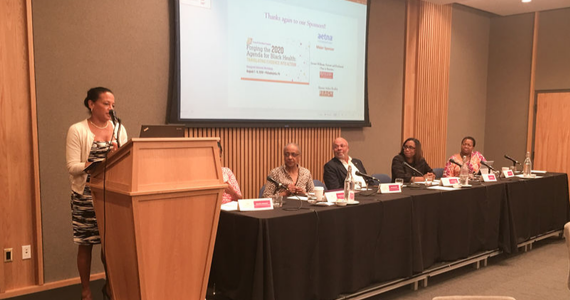Council on Black Health Initiates New Approach to Addressing Health Issues that Affect Black Americans
 Linda Goler Blount, MPH, President & CEO, Black Women's Health Imperative, addresses attendees of the Council on Black Health conference.
Linda Goler Blount, MPH, President & CEO, Black Women's Health Imperative, addresses attendees of the Council on Black Health conference.
September 17, 2019
Black scholars, community research partners, health professionals and representatives of several of the nation’s largest black organizations, came together at Drexel University on August 7th through 9th to explore and develop ambitious new solutions to the health issues the affect black men, women, and children in communities around the country.
The inaugural conference of the Council on Black Health (CBH), a program hosted at the Dornsife School of Public Health, began with an embrace of African tradition, expressed through dance, a perfect setting for keynote speaker Joia Crear Perry, MD, president of the National Birth Equity Collaborative in New Orleans and Co-Founder of the Health Equity Cypher. Perry’s talk “Igniting the Flame: Decolonization of Health,” highlighted the many ways the health of people of African-descent has been negatively impacted by generations of racism that have shaped medical and other health research, treatment, policies and practice in the United States.
Perry underscored the importance of the conference’s primary goal, to do “groundbreaking work” by finding effective ways to translate the innovative findings from the evidence gathering and research studies, conducted by CBH members, into ways to improve the health of people in black communities, according to Shiriki Kumanyika, PhD, MPH, the founder of CBH, a professor of Community Health and Prevention at the Dornsife School of Public Health and an emeritus professor of Epidemiology at the University of Pennsylvania’s Perelman School of Medicine.
While many scholars and organizations have taken on the challenge of addressing the complex health issues that disproportionally harm black communities, CBH is calling for a reframing of the conversation about black health. “The first order of business is to believe that health equity for black Americans is an achievable goal and work against the common perception that black health problems are hopelessly and permanently unfixable. The next steps involve promoting this positive vision to inspire bold and innovative actions that can have true societal impact.”
In support of this mission, CBH is proposing a Black Health Bill of Rights as a set of guiding principles for communities, CBH researchers, and others who advocate for black health. The bill includes: “the right to reimagine and transform our life and health as a shared value (in alignment with nature) and the right to research Black health with a decolonized and equitable lens.”
These objectives will be at the forefront of CBH’s work in the coming year. Working groups formed at the conference are developing evidence-to-action plans around areas deemed to be of high priority for black health — early childhood education; income inequality and wealth, and the built environment.